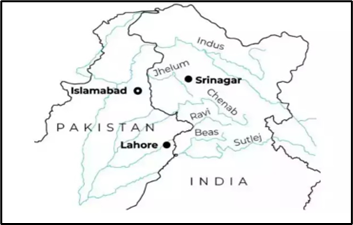Why in news?
India has sent a new formal notice to Pakistan seeking the "review and modification" of the Indus Waters Treaty (IWT), following a similar request in January 2023.
This latest notice, issued under Article XII (3) of the IWT, is significant as the inclusion of "review" suggests India's intention to potentially revoke and renegotiate the 64-year-old treaty.
Article XII (3) allows for modifications of the treaty through a duly ratified agreement between the two governments.
What’s in today’s article?
- Indus Waters Treaty (IWT)
- India demands modification of IWT
Indus Water Treaty (IWT)

- About
- The Treaty is a water-distribution treaty between India and Pakistan, brokered by the World Bank.
- According to this treaty, three rivers: Ravi, Sutlej and Beas were given to India and the other three: Sindh, Jhelum and Chenab were given to Pakistan.
- Rights & obligations under this treaty
- India is under obligation to let the waters of the western rivers flow, except for certain consumptive use.
- The treaty allocates Pakistan approx. 80% of the entire water of the six-river Indus system and reserved for India just remaining 19.48% of the total waters.
- India can construct storage facilities on western rivers of up to 3.6-million-acre feet, which it has not done so far.
- The IWT permits run of the river projects on the western rivers, subject to specific design and operation criteria.
- India is required to provide Pakistan with prior notification, including design information, of any new project.
- Dispute redressal mechanism under the Treaty
- Article IX of the Treaty is a dispute resolution mechanism - graded at three levels to resolve a difference or a dispute related to projects on the Indus waters.
- First level
- Either party has to inform the other side if they are planning projects on the Indus river with all the information that is required or asked for by the other party.
- This process is done at the level of the Permanent Indus Commission (PIC), created to implement and manage the goals of the IWT.
- If PIC is unable to solve the question in contention, the question becomes difference and goes to second level.
- Second level
- The second grade is the World Bank appointing a neutral expert to resolve the differences.
- If a neutral expert cannot resolve the issue, the difference becomes a dispute and goes to third level.
- Third level
- At this level, the matter goes to a Court of Arbitration (CoA) whose chair is appointed by the World Bank.
India demands modification of IWT
- About the news
- Citing fundamental and unforeseen changes in the circumstances, India has sent a formal notice to Pakistan to seek a review of the IWT.
- It has also cited the impact of persistent cross-border terrorism as one of the reasons for demanding the reassessment of the pact.
- The notification highlights fundamental and unforeseen changes in circumstances that require a reassessment of obligations under various articles of the treaty.
- India had also sent a notice to Pakistan in January 2023 seeking amendment to 1960 treaty.
- Reasons behind India’s demand to renegotiate the treaty
- India's latest notice to Pakistan on the Indus Waters Treaty (IWT) cites "fundamental and unforeseen changes in circumstances" as reasons for reassessment.
- Concerns include changes in population demographics, environmental issues, the need for clean energy development to meet emission targets, and the impact of cross-border terrorism.
- The notifications come amid controversy over two Indian hydel power projects in Jammu & Kashmir — Kishanganga and Ratle — which Pakistan alleges violate the IWT.
- These projects are "run-of-the-river" and generate electricity without obstructing river flow.
- Reason behind the notice in January 2023
- India's latest notice to Pakistan regarding the IWT follows Islamabad's objections to two Indian hydel projects.
- Pakistan initially sought a "Neutral Expert" to address its concerns but later proposed the Permanent Court of Arbitration (PCA) for adjudication.
- India objected, citing this as a breach of the treaty’s sequential dispute resolution mechanism, which starts with the Indus Commissioners, then a Neutral Expert, and finally the PCA if needed.
- The World Bank halted the dual processes in 2016, urging both countries to resolve the issue amicably.
- Despite attempts by India, Pakistan did not engage in discussions between 2017 and 2022.
- In 2022, the World Bank decided to proceed with both the Neutral Expert and PCA processes, leading to India’s January 2023 notice, the first in over 60 years.










